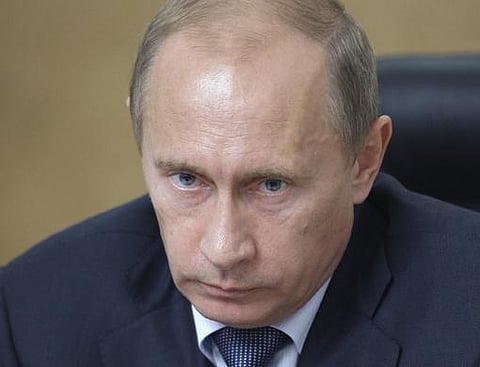Putin markets himself to Russia
Prime minister participates in publicity stunts designed to promote his image

Vladimir Putin looked smooth, tanned and rested.
He had a fun summer, most of it televised by state channels. He took a spin on a Harley with a bunch of bikers, had a go at flying a firefighting jet and dropping water on the wild forest fires in central Russia, fired darts at a grey whale, and most recently drove thousands of miles across Russia's tundra in a canary-yellow Lada accompanied by dozens of foreign-made security cars and two spare Ladas — just in case.
Out of these antics emerged the image of a hands-on, no-nonsense and down-to-earth ruler who feels at ease with rough-speaking truck drivers. In any democratic country such public-relations stunts could have been mistaken for part of an election campaign. In Russia, where political competition is long gone, they are part of Putin's political housekeeping, helping to keep up his image as a good tsar who is the flesh and blood of his people.
When the Valdai club, a group of mostly foreign experts on Russia, asked him over dinner on September 6th about his plans for the next presidential election in 2012, Putin positively glowed with pleasure.
He cited the example of Franklin Roosevelt, who was elected American president four times to Putin's twice (in 2000 and 2004). This answer was interpreted by most as a clear sign that the prime minister wants to come back as Russia's president for two more six-year terms. In fact, the question of Putin's return is artificial, for he has never really left power in Russia, but simply switched job title.
More than two years into his presidency, Dmitry Medvedev seems no more powerful than when he was, in effect, appointed to the job by Putin. There are signs, however, that the Kremlin wants to draw a stylistic distinction between the two men.
This may explain Medvedev's decision not to meet the Valdai club, as he did last year. On September 9 and 10 he was due to stage his own show in the Russian city of Yaroslavl, on his favourite theme of modernisation, which he advertised a year ago in an online article: "Go, Russia!"
Despite the commanding words, there has been precious little progress. After a few days of anguished discussion about Russia's direction, the Valdai club gloomily concluded that the country was stagnating — an opinion shared even by most Russian participants. The club said in a report that "there is practically no real modernisation, restructuring or diversification, oil and gas remain the main sources of revenue, corruption continues unchecked and there is almost zero innovation."
When these conclusions were put to Putin, however, he largely rejected them as empty chatter that ignored his government's concrete deeds. He cited the abolition of import duties on high-technology equipment and spoke of Russia's successful diversification into different industries. He talked up the amount of foreign investment, even though he admitted that most of it was in the energy sector.
But what his answers demonstrated was a firm belief in the virtues of today's political system. The overriding purpose of modernisation is not to change the political set-up or overhaul state institutions, but to refine and preserve the system and justify the central role of the state (and the unchecked power of its security services).
Only the state and its guardians are capable of taking a country of Russia's size and history forward, the argument goes. As Vladimir Yakunin, the head of Russia's railways and a former KGB officer who is close to Putin, argued in a letter to The Economist last week, state capitalism of the Chinese kind "simply works better". Russia's past attempts to "reject all history and tradition, combined with the blind imitation of foreign experience, impeded the country's political and economic development for 20 years."
Failing in basic functions
Yet the real problem is not that the state in Russia is too powerful or ambitious, but that it fails in its basic functions of providing adequate health care, security, justice and infrastructure. At the same time, corruption has become institutionalised. Earlier this year, at a forum in Krasnoyarsk that gathered the country's business and political elite, most participants were stuck to name one state institution that works.
Paradoxically, the statist rhetoric is combined, in the minds of many officials, with extremely low expectations of what the state is supposed to accomplish. This was starkly revealed in another Valdai interview, with a top official. Responding to accusations of government ineffectiveness in tackling the summer's forest fires, he said it was never any use relying on the fire brigade, which always came too late. People had to look after themselves.
The official argued that this was true everywhere, even in central London, where he owns a flat. The idea of an accountable state providing public services was clearly absurd (unlike the idea of Russian bureaucrats owning expensive flats abroad).
The main role of the state, to Putin and his entourage, is to keep political order; or, to put it differently, to protect the state and the vested interests of its bureaucracy. Public protests organised by opposition leaders are provocations. Those who join them deserve what they get.
As Putin put it (thrice) in a recent interview with Kommersant, a daily newspaper, "Go out [to demonstrate] without a permit — you get a whack on the head. That's all there is to it."
Sign up for the Daily Briefing
Get the latest news and updates straight to your inbox



